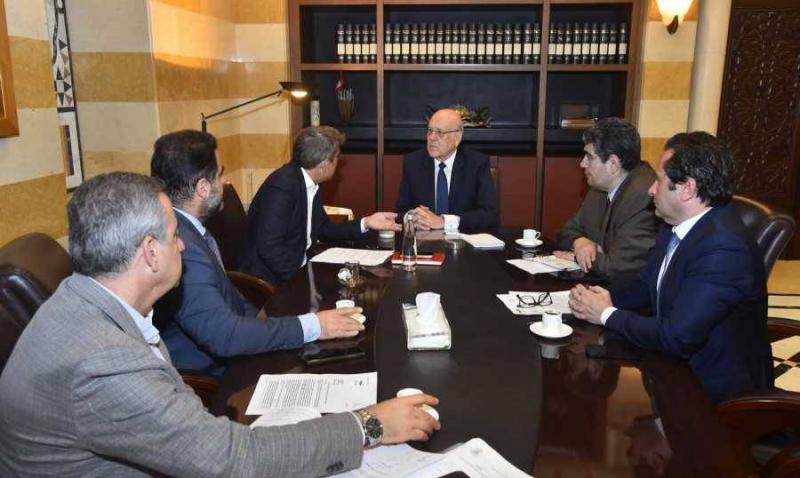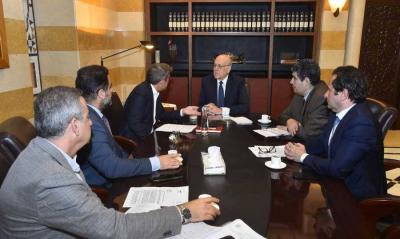Prime Minister Najib Mikati chaired two meetings at the Grand Serail. The first included Minister of Energy and Water Walid Fayyad and the "Petroleum Sector Management Authority," while the second included Minister Fayyad and the Director-General of Electricité du Liban, Kamal Hayek. Fayyad stated after the meetings that, "At my request, we had two meetings with the President, the first was dedicated to the Petroleum Management Authority which had administrative demands, while the second focused on Electricité du Liban. We discussed important topics, the most significant being: the priority to increase electricity supply based on our proposal and Electricité du Liban's desire. This involves increasing production in the summer from 450 megawatts to 600 megawatts, which can be achieved by increasing the operational capacity of the Deir Ammar or Zahrani plants, while simultaneously working on the file to restart the Zouk and Jiyeh plants, which provide cheaper electricity than 'gas oil.' However, this matter is still under study at the Court of Accounts, and there is a meeting next Tuesday to find a solution for restarting these plants because, in their absence, electricity production via 'gas oil' is more costly than its production through 'fuel oil.' The cost of producing electricity from 'gas oil' is about 14 cents, while from 'fuel oil' it is about 11 cents, so it is better for Electricité du Liban and the people to use 'fuel oil' in Zouk and Jiyeh.
The second topic we discussed was the priority to increase supply from renewable energy, not just through individual devices but through solar power plants. First, is the commitment of CMA-CGM regarding the two licenses it owns, and the urgency in implementing the project in the regions of Mount Lebanon and the North to increase solar energy generation by 15 megawatts at each station. Our goal, with Electricité du Liban, is to assist this company in implementing the project quickly, especially in terms of technical connections and studies. At the same time, we presented to Electricité du Liban the message we received from Total Energies and Qatar Energy, which reaffirmed their desire to support Lebanon on this matter by creating a solar plant with a capacity of 100 megawatts. He added: We agreed with Prime Minister Mikati to find the best and fastest mechanism to enable them to do this under the best commercial conditions. We will also explore if it is possible to proceed with this matter through the existing licenses held by other companies or otherwise.
The third topic we discussed was the collection and the necessity for the public sector to commit to paying its outstanding bills, especially since the Cabinet and the Ministry of Finance allocated a treasury advance worth 6 trillion Lebanese pounds to pay all dues from October 2022 until the end of June 2023. However, to date, public administrations and institutions have not paid a penny to Electricité du Liban. I urge public administrations and institutions to send the required notifications to the Ministry of Finance, including the notifications they received from Electricité du Liban regarding electricity dues amounting to about 4.5 trillion Lebanese pounds. Public institutions and administrations are required to send messages totaling 4.5 trillion to the Ministry of Finance so that it can implement the treasury advance and pay the dues. In the absence of this, Electricité du Liban has no choice but to cut electricity starting mid-June next year, so it is crucial to expedite this matter today before tomorrow.
The fourth topic we discussed was the dues owed by Electricité du Liban to the funds and creditors, such as the Arab-Kuwaiti Fund and others. We informed the director general about the new information that the dues owed by the state and Electricité du Liban from loans from Arab funds, ranging between 5 and 8 million US dollars, which had been due since 2020 until the end of 2023, have been cleared, and all these dues have been paid. This news is very beneficial and important as it restores the regular relationship of Electricité du Liban as a debtor with its creditors from the Arab funds, and opens the door for renewed financing from these funds, which is very important. We rely on the Arab-Kuwaiti Fund to renovate the electricity building and control center because it helps in managing electricity distribution and transmission, as well as the management of information more accurately than currently, which was damaged due to the Beirut port explosion.
Finally, we addressed the step towards transitioning to gas. Since the expected Egyptian gas has been delayed for political reasons, we are considering the possibility of establishing gasification stations through a tender process in this regard. The Prime Minister also received a farewell visit from the United Nations Special Coordinator in Lebanon, Joanna Wronecka, on the occasion of the conclusion of her mission in Lebanon.




